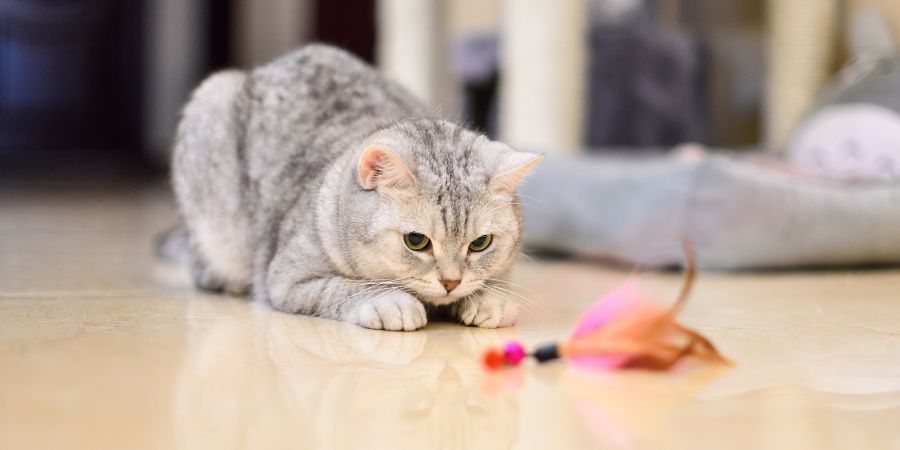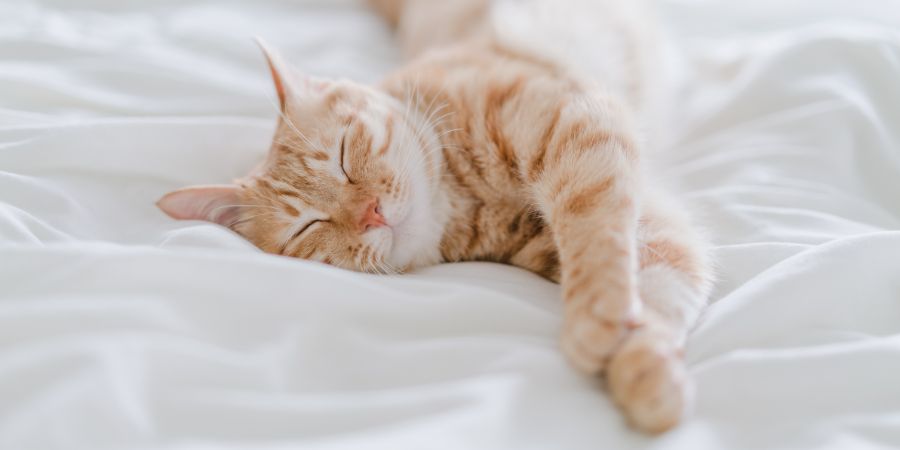Cats can spend over half of their lives asleep, so it’s no surprise they’ve developed a reputation for being the world’s best snoozers! But why is it that cats sleep so much? And just how do they sleep? Keep reading to find out more...
Catnapping? It’s in their nature!
Cats are crepuscular, meaning they’re most active at dusk and dawn, which is all down to their hunting instinct. As cats are natural predators, it’s in their DNA to be awake during these hours and go hunting for prey (who are also most active at this time). In fact, our feline friends are well equipped to be up and about at this time because their eyes are more adapted to low light, meaning they can still see movement in these conditions very clearly. Domestic housecats still have that same wild streak too – even if it means they’re bouncing around a room chasing after an insect or a toy mouse instead!
Vet Q&A: Why is my cat hunting?
Hunting is a natural behaviour for cats. However, running, stalking, and pouncing are very tiring for our four-legged friends, and an active period of play can leave them feeling ready to rest and recharge. During a ‘hunt’, cats use lots of energy to stay alert and – just like humans – the only way to build their energy levels back up and to conserve their energy for the next hunt is through sleep, which is some of the reasons cats spend a lot of their day doing exactly that.

How long do cats sleep?
On average, cats sleep 15 hours a day, though some cats may spend up to 20 hours asleep. Cats will usually sleep in several short bursts rather than one long sleep. However, sleeping behaviours can vary from cat to cat and depends on the following:
- Age: cats need more or less sleep depending on how young or old they are. As kittens and senior cats need more shuteye than adult cats, they may spend closer to 20 hours sleeping each day.
- Physical health: A cat who is ill or injured may spend more time asleep than a cat with no health concerns.
- Mental health: If a cat lacks mental stimulation, they’ll often resort to a nap.
- Weather: Cats tend to avoid bad weather in colder seasons, preferring to get extra zzz’s over a night of exploring in the heavy rain.
- Temperament: Their unique and individual personalities mean that some cats are much more relaxed, laid back and happy to sleep than others.
- Indoor cats vs outdoor cats: Outdoor cats typically sleep less than housecats because they spend more time exploring their surroundings or socialising outside.
How do cats sleep?
Cats either doze in a light sleep (known as non-REM sleep) or sleep very deeply (known as REM sleep) and alternate between the two.
Cats sleep in ‘standby mode’ when dozing and stay alert to their surroundings. Their senses remain at work, and the smallest sounds are often enough to wake them up. Some cats even sleep with one eye half open, so they can always be on the lookout for potential dangers, or in an upright position so they’re ready to spring into action at a moment's notice. For cats, a light sleep will often last between 15 and 30 minutes before they settle down into deep sleep1.
During deep sleep (which typically lasts 5-7 minutes2), cats are much harder to wake up. Usually, you’ll find them snuggled up in a safe space, alone, so they can fully unwind. Their bodies relax, and you may see them stretched out completely. If you notice a few sleep-induced twitches or sudden movements here and there, your feline friend is likely dreaming about their life experiences before they re-enter a transition of light sleep once more. Around 25% of their total sleeping time is spent in a very deep sleep.

Is my cat getting the right amount of sleep?
Sleep is as important for cats as it is for humans.
If your four-legged friend seems restless, irritable, or confused, it may be down to sleep deprivation. Unfortunately, a cat who isn't getting enough sleep is also more likely to become physically ill because of the stress inflicted on their body3. To help your cat get enough sleep, make sure they have the ideal napping spot in a quiet area of the home. Cats feel safest when they’re off the ground, so think about adding soft blankets to a cat shelf or window ledge.
If you’re worried your cat sleeps too much, it may be down to boredom. To keep your four-legged friend physically, emotionally, and mentally healthy, ensure they get lots of play and exercise throughout the day. A scratching post is a great way for them to express their normal scratching behaviour, whereas vet-approved balls and teaser toys will keep them active with lots of jumping and chasing. A rigorous play session in the evening will also help to zap their energy levels, especially if your cat tends to pester you with early wake-up calls!
However, if your cat is constantly lethargic and doesn’t want to engage in pleasurable activities (e.g. petting, feeding, or playtime), speak to your vet. A sudden change in their sleeping pattern or excessive napping can be a sign of an underlying health condition, so it’s essential to get them checked over by a professional.
Read next: Weird things cats do
1 John Bradshaw, Rachel Casey, Sarah Brown (2012). The Behaviour of the Domestic Cat.
2 M. Jouvet (1965). Behavioural and Eeg Effects of Paradoxical Sleep Deprivation in the Cat.
3 Vicky Placzek RVN and Katie Smith RVN. The Importance of Sleep. Available at: https://www.cats.org.uk/uploads/documents/The_Cat_Mag_extracts/Veterinary_-_the_importance_of_sleep.pdf.
